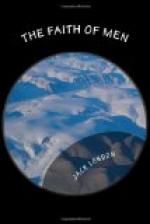A HYPERBOREAN BREW
[The story of a scheming white man among the strange people who live on the rim of the Arctic sea]
Thomas Stevens’s veracity may have been indeterminate as x, and his imagination the imagination of ordinary men increased to the nth power, but this, at least, must be said: never did he deliver himself of word nor deed that could be branded as a lie outright. . . He may have played with probability, and verged on the extremest edge of possibility, but in his tales the machinery never creaked. That he knew the Northland like a book, not a soul can deny. That he was a great traveller, and had set foot on countless unknown trails, many evidences affirm. Outside of my own personal knowledge, I knew men that had met him everywhere, but principally on the confines of Nowhere. There was Johnson, the ex-Hudson Bay Company factor, who had housed him in a Labrador factory until his dogs rested up a bit, and he was able to strike out again. There was McMahon, agent for the Alaska Commercial Company, who had run across him in Dutch Harbour, and later on, among the outlying islands of the Aleutian group. It was indisputable that he had guided one of the earlier United States surveys, and history states positively that in a similar capacity he served the Western Union when it attempted to put through its trans-Alaskan and Siberian telegraph to Europe. Further, there was Joe Lamson, the whaling captain, who, when ice-bound off the mouth of the Mackenzie, had had him come aboard after tobacco. This last touch proves Thomas Stevens’s identity conclusively. His quest for tobacco was perennial and untiring. Ere we became fairly acquainted, I learned to greet him with one hand, and pass the pouch with the other. But the night I met him in John O’Brien’s Dawson saloon, his head was wreathed in a nimbus of fifty-cent cigar smoke, and instead of my pouch he demanded my sack. We were standing by a faro table, and forthwith he tossed it upon the “high card.” “Fifty,” he said, and the game-keeper nodded. The “high card” turned, and he handed back my sack, called for a “tab,” and drew me over to the scales, where the weigher nonchalantly cashed him out fifty dollars in dust.
“And now we’ll drink,” he said; and later, at the bar, when he lowered his glass: “Reminds me of a little brew I had up Tattarat way. No, you have no knowledge of the place, nor is it down on the charts. But it’s up by the rim of the Arctic Sea, not so many hundred miles from the American line, and all of half a thousand God-forsaken souls live there, giving and taking in marriage, and starving and dying in-between-whiles. Explorers have overlooked them, and you will not find them in the census of 1890. A whale-ship was pinched there once, but the men, who had made shore over the ice, pulled out for the south and were never heard of.
“But it was a great brew we had, Moosu and I,” he added a moment later, with just the slightest suspicion of a sigh.




